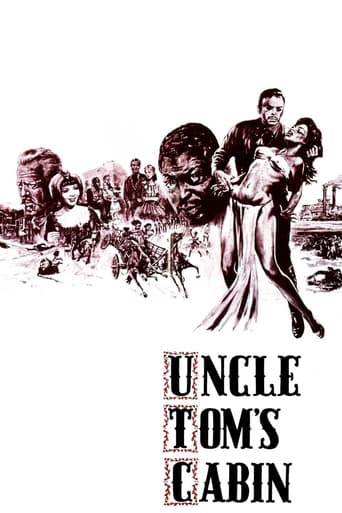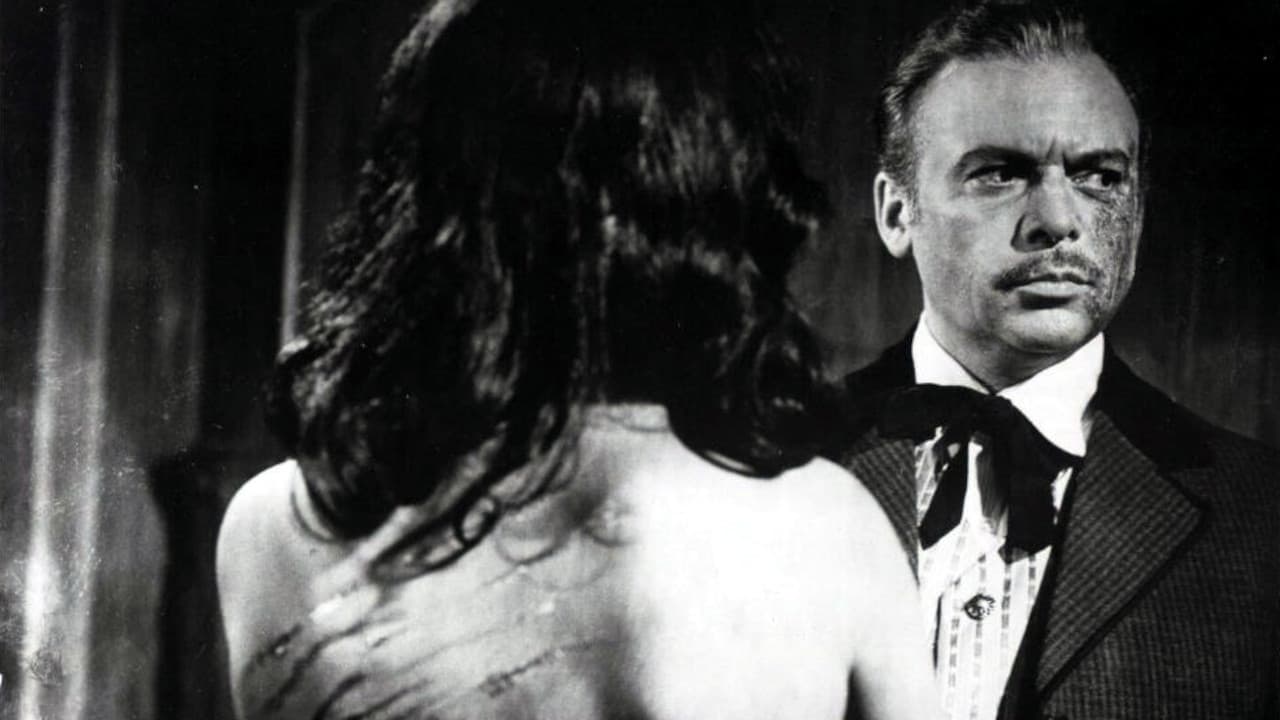clanciai
When this German-Italian film production came to town in 1968 I sadly missed it and didn't get a new opportunity until now, when it was 50 years old, but its age has not impeded its impact. It was a sensationally positive surprise to observe how interestingly the book has been tampered with to make it an even better film. The book was certainly one of the most important and influential novels of the 19th century, and, as Lincoln said, it was what started the war; Leo Tolstoy ranked it as one of his favourites especially for its consequences, only books like 'Oliver Twist' and 'Les Miserables' had similar social effects, in all its roughness the book remains an absolute classic, and the film lives more than well up to it.The credits are many. The first one must go to John Kitzmiller, who makes a perfectly convincing Uncle Tom in an intensely warm and sustained human performance, and what a wonderful idea that he starts singing and has such a wonderful voice at that! The Negro Spirituals of the film greatly enhance its emotional pathos and add a glowing colour of aesthetic charm and human dignity to the film. He is seconded by Olive Moorefield as Cassy, whom the film successfully makes more of than the book, while Herbert Lom as the supreme villain Simon Legree, who is allowed to dominate the film from the very beginning, has never had a better time for a full range of his acting since he was Napoleon in 'War and Peace', the best Napoleon ever, by the way. The others fall in line and support the drama satisfactorily well.Max Ophuls would have loved this film for its wonderful details. The riverboat journey is a highlight, much effort has been given to reconstruct a perfect and intact 1850s environment in homes and towns, there is a marvellous sequence from old New Orleans with a circus and parade, there is a splendid tavern brawl, and where did they find that fascinating music box? I have never seen one so large. Another striking detail is the guest appearance of Juliette Greco, she didn't appear in many films and only exclusively, and while she appears you can't take your eyes from her fascinating character.The alterations from the book are on the whole well construed. That Legree is in from the beginning sets the drama off directly, the invented cause of little Eva's sudden death adds another interesting intrigue not at all implausible, Eliza's amazing escape never fails to impress both on screen and in the book, and it's a good idea not to let her come home until the very end, to at least give the end one good turn of relief.On the whole, this is a film that never reached its appropriate recognition, it is indeed worth discovering and loving, while at the same time it constitutes an enriching and well deserved compliment to the book.
tom_amity
**SPOILERS**One can only be pleasantly surprised by this intelligent adaptation of the American classic, especially since UNCLE TOM'S CABIN is so widely and unjustly attacked, pilloried and distorted.The novel's author, Harriet Beecher Stowe, was the daughter of the anti-slavery activist Henry Ward Beecher. The house in which she was raised was an Abolitionist nerve center: every character and every event in the novel is based on fact. Despite popular distortions, Stowe's title character is not at all remotely similar to what is commonly called an "uncle tom" (=an African American who sucks up to whites); he is a figure of towering dignity, one who takes his Christianity very seriously, who resists evil with all his being while rejecting hate and violence, who provides moral leadership for his enslaved neighbors, who is beaten senseless by his owner for refusing to flog a fellow slave and tortured fatally for not revealing the whereabouts of fugitive slaves. He is in fact proof that Martin Luther King's program of nonviolent resistance did not just derive from Gandhi but had roots in African-American culture. The portrayal of Tom in the film, by an almost unknown American actor, conveyed that brilliantly.Before commenting on the other actors, one should note (as another reviewer at this site has already done) that there are some weird and not very well conceived changes in the plot. For example, I cannot guess why Eliza's desperate flight across the ice floes of the Ohio River (historically true, by the way) was not in the film; a proper portrayal could have rescued this scene from the stupid cliches to which it has been commonly reduced, and could make it fully as harrowing as it ought to be. Nor do I understand why Tom's death (in the film) is due to a fall from a wagon, rather than (as in the book)his torture by a sadistic master, maddened by Tom's goodness and determined to break him by making him betray his friends.Be that as it may, the other characters are well acted also: Topsy, as in the book, is not the familiar "pixie" but (as in the book) near-autistic from neglect and abuse; Shelby is the deluded, weak liberal who congratulates himself for his kindness and magnanimity but is ready to rationalize selling Tom to pay a debt ("I'll buy him back someday"); Legree is the transplanted New Englander, hating himself for what he does, and sadistic like all those who spend their energy doing what they know they shouldn't, whose only companions are his likewise self-hating Black slave drivers and the slave girl of 15 whom he sexually abuses. All these portrayals are faithful to the novel.I also congratulate the filmmakers on their correction of the book's one great flaw, namely the portrayal of the saintlike child Eva. Stowe pulled out far too many stops in drawing Eva: her mushy sermons and preternatural goody-goodiness is so cloying as to be embarrassing to the reader. In this film, all that crud is mercifully toned down, though she does remain (believably) a child wise and gentle beyond her years; and we all HAVE known at least one such child, have we not?All in all, a most unexpectedly fine piece of cinema.
andrewbk
Uncle Tom's Cabin is my most favourite novel ever. It is reasonable that I've been at quest to find a film version that can do it some justice.Unfortunately, I was thoroughly disappointed with this movie. While it may retain some semblence of the outer shell of the story along with a few character names, the vital core of the story is entirely changed. I would challenge any film company to depict this story faithfully.It must also be pointed out that while the characters are in themselves ficticious, most of the events in the book actually happened.The actual story is so magnificent that I shall not write any major spoilers here, albeit one or two necessary to discuss. The real ending however, of which the movie totally replaced, must remain a closely-guarded secret, reserved only for those who brave the book.The original story was intended to argue Christian values against the cruel and inhuman system of slavery at the time. It is therefore intensely fundamental in its Christian basis.Tom is a committed and devoted Christian, unswervable in his absolute faith despite intense oppression. He has a well-worn Bible that he reads at any opportunity, and regularly proclaims the Gospel with almost everyone he interacts. Evangeline, who is only five years old in the book, is likewise if not more so. There was no event anywhere in the book of Tom encouraging others by singing. Rather, it is always by evangelism and prayer. (That revolting substitution was an unforgivable degradation to his character.) And it is little Eva who is able to spiritually penetrate the stonehearted and belligerent child-slave Topsy with the meaning of divine love, that chapter in the book being one of the most remarkable of all.This movie deletes the Christian themes entirely. The one scene which makes a vague mention of it is not found anywhere in the book. (Spoiler) In fact, the movie wrongly shows Tom being injured in a wagon accident, when in the book he was physically beaten to death by Legree for withholding intelligence on Cassy's whereabouts, for he would "not betray the innocent." The martyrdom in the story is tremendous and very tragically discarded in this movie. And Cassy's real hiding place was far more ingenious and exciting than the way it was shown in this cowardly film.The story really follows two paths: Tom who is sold south because of his master's debt and Eliza who makes a desperate break for freedom to protect her child whom she learnt had been sold as well. Eliza's infamous river crossing, (which is historically true), was terribly underplayed in this movie. In the book, she had taken refuge at a small inn by the Ohio River in Kentucky, looking for a way to cross. When several slave catchers bore down on her location, she took up her five year old child, scrambled down the riverbank and made a desperate flying leap over about ten feet of turbulent current onto an ice floe, which pitched wildly under her weight. Upon reaching the Ohio side, a neighbour she knew helped her up the bank and led her to some abolishionists with the Underground Railroad. Then with the assistance of Quakers was reunited with her fugitive husband enroute to Upper Canada. This movie very wrongly shows Eliza travelling into the deep south to be hidden by Cassy. This is strongly contradictory to the story and doesn't even make sense.The one positive comment I can make is that it appears as though some effort was put into the sets and costumes. It is only tragic and wasteful that the story was not better preserved.So in summary, this movie makes a weak attempt to tell a grossly modified version of the story, while it cowers away from its core themes and real exulting climax.(I welcome feedback from any fans of the book who want to discuss the story! I am rather passionate about it.)
dbdumonteil
Although well known in the whole world "Uncle Tom's cabin" has never been the subject of a major American motion picture.It's easy to see why;the paternalistic side of this mammoth novel has grown unbearable to some:who among the most famous black actors would accept a "yessir " part?It's easily understood,even if Hattie MacDaniell received a colored actor's first AA, for just that kind of role.(Gone with the wind)So this big budget European movie.Like the precedent user,I saw this production a long long long time ago,but I've got a vivid memory of it. It's interesting to note that the director,Geza Radvanyi, made one masterpiece "Valahol Europa'ban"(somewhere in Europa) and after soon degenerated into what the German critics call "films limonades" (mushy movies)."Uncle Tom 's Cabin" is more an European movie than a German one:Italian actors(Eleonora Rossi-Drago) meet German (Herbert Lom) or French ones (Juliette Greco,Mylène Demongeot)ones. Mrs Beecher -Stowe would be turning in her grave if she saw some of the scenarists' "adaptations":On the boat,there's a steamy (for the time) scene between Legree and Cassy.Exit chaste old cousin Ophelia,and make way for a vivacious gorgeous young Harriet.Besides,the deadly serious M.Saint-Clare goes to see a hostess in a bar .(Juliette Greco).The end of the movie becomes epic,as the slaves rise up against their "owners".On the plus side:beautiful Negro spîrituals during the Mississipi shots and a nice Evangeline Saint-Clare played by Gertraud Mittermayer.However,it's doubtful that this movie should be reissued some day.


 AD
AD


